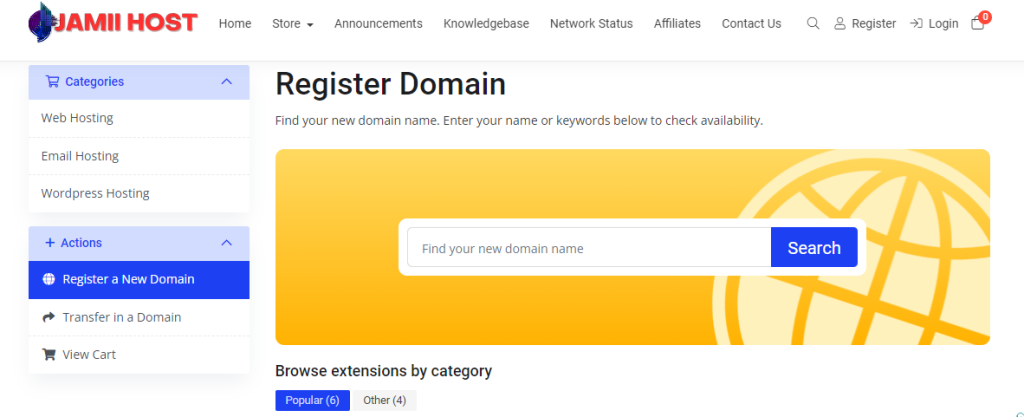
The Pros and Cons of .co.ke vs .com Domains in Kenya: The choice between a .co.ke and .com domain is an important decision for any business or organization establishing an online presence in Kenya. While .com domains are popular globally, .co.ke domains have emerged as the preferred choice for many Kenyan entities. Below is an overview of the key pros and cons of selecting a .co.ke vs .com domain when registering a website in Kenya:
The Pros and Cons of .co.ke vs .com Domains in Kenya
Pros of .co.ke Domains
Local identity – The .co.ke extension identifies a website as belonging to an organization located in Kenya. This helps establish trust and familiarity with Kenyan users who recognize .co.ke as a local domain. Websites with .co.ke domains are perceived as authentically Kenyan brands.
Search engine ranking – Search engines like Google may prioritize .co.ke sites over .com when presenting results for searches focused on Kenya. This can lead to better visibility and search engine rankings in the Kenyan market.
Cost – .co.ke domains are significantly cheaper to register compared to .com domains which are seen as global domains. .co.ke domains can cost as little as 999 KES for the first year compared to 1700 KES and up for a .com domain. Renewal costs are also lower for .co.ke domains. Check out Current prices of domains from jamii host
Easier approval – The .co.ke extension is regulated by Kenya Network Information Center (KENIC) making the domain verification and approval process faster compared to .com domains which require global accreditation.
Government recognition – The Kenyan government recognizes .co.ke domains as legitimate national domains which makes them ideal for use by organizations such as state corporations.

Cons of .co.ke Domains
Limited international appeal – While .co.ke domains work for national presence, they may not be ideal for organizations targeting audiences outside Kenya. .com has wider international appeal.
Registration restrictions – .co.ke domains have tighter registration requirements and restrictions compared to the more open .com domains. Domain squatters also target .co.ke names.
Smaller scope – The availability of .co.ke domain names is low compared to .com. Finding a good brand name on the .co.ke domain requires early registration.
Limited web hosting options – Web hosting providers outside Kenya may not recognize or support .co.ke domains by default. Hosting locally can increase costs.
Bureaucracy – Delays during .co.ke registration due to extensive paperwork and complex domain name ownership transfer rules are common.
Low recall – Many international users may not readily identify or recall .co.ke domains which lack the globally recognizable .com identity.
Pros of .com Domains
.com is global – The .com extension does not tie your website to any single country making it ideal for startups and companies targeting worldwide reach.
Universal trust – Internet users globally are familiar with and trust the .com domain which has been in use for decades. The .com extension signals credibility.
Better SEO value – Search engines favor .com websites which generally rank higher in search results compared to ccTLDs like .co.ke.
Domain flexibility – There are minimal restrictions on the use of .com domains allowing for more creativity in name selection. Domain names can be changed easily.
Better branding – Startups and brands can establish strong identities using .com domains without appearing limited to any geography.
Resale value – Premium .com domains tend to appreciate in value over time and have higher resale prices in aftermarkets compared to ccTLD extensions.
Global infrastructure – .com works seamlessly with most web hosts, email providers, and internet infrastructure across the world.
Memorability – The ubiquity of .com makes these domains easy to remember. Users instantly recognize .com sites.
Cons of .com Domains
Higher cost – .com domains are more expensive to buy with renewal fees also being higher compared to ccTLD extensions which are priced affordably.
Domain crowding – The high demand for .com domains means most short and memorable names are already taken. New businesses may have to settle for suboptimal .com names.
No localization – Unlike ccTLDs like .co.ke, .com domains do not convey any local association. This can be a downside when targeting local markets.
Global competition – A .com domain lacks uniqueness and puts you in direct competition with global players in your niche when promoting your website online.
May limit growth – Startups with global ambitions that lock themselves into .co.ke or other ccTLD domains early on face challenges rebranding later into .com.
Less government trust – ccTLDs like .co.ke enjoy special recognition and privileges from local governments that may not be accorded to .com websites.
When choosing between .co.ke and .com domains in Kenya, there are strong cases to be made for both options. .co.ke establishes local presence and trust, while .com has wider appeal and trust globally. Much depends on the specific objectives and target markets for your online presence.
For organizations focused on the Kenyan market like SMEs and local startups, .co.ke makes sense as the ideal local domain extension. However, global brands and companies with international aspirations may be better served by .com domains.
The best solution may also be to secure your brand name on both the .com and .co.ke domains for maximum online presence. This provides the flexibility to tailor content and messaging for both local and global audiences.
With both .co.ke and .com domains having clear advantages and disadvantages, evaluating your priorities and audience helps determine the ideal domain for your Kenyan online presence.
Before settling on a .co.ke or .com domain, carry out due diligence to determine which works better for your objectives.
Factors to Consider When Choosing Between .co.ke and .com
Business model – Local businesses like law firms or restaurants are likely better suited to .co.ke while ecommerce companies with global reach lean towards .com.
Target audience – If most of your customers are in Kenya, a .co.ke domain may be ideal, but if you want to target audiences worldwide, .com may be preferable.
Expansion plans – Startups aiming for rapid global growth should consider .com to avoid limiting their expansion abilities early on.
Brand identity – The .com vs .co.ke extension influences how your brand name is identified and perceived. Evaluate what works best for your brand.
Domain availability – If your preferred brand name is already taken on .com, .co.ke may offer better availability or vice versa.
Acquisition costs – Factor in the costs of purchasing and renewing your preferred domain for years to come. .co.ke domains are cheaper initially but renewals add up.
Search optimization – Research whether Google gives preference to .co.ke or .com for searches related to your products, services or local market.
Local compliance – Some sectors like gambling require using .co.ke domains which are regulated locally for compliance purposes.
Government tenders – Local tenders often only accept bids from .co.ke websites which are perceived as authentically Kenyan companies.
Tips for Deciding Between .co.ke and .com
- Check if your preferred brand name is available on both .co.ke and .com to keep your options open.
- Test the SEO value of the same brand name on .co.ke and .com using online SEO tools to see which ranks better.
- Send test emails from both a .co.ke and .com domain to see if deliverability rates differ.
- Set up basic landing pages on a .co.ke and .com domain to test local user response and trust metrics.
- Evaluate the importance of international recognition versus local credibility for your brand.
- Budget for longer term costs of domain purchase, renewal, and hosting for both .co.ke and .com domains.
- Research what competing brands in your industry use (.co.ke or .com) and consider following industry best practices.
The .co.ke vs .com domain choice should ultimately come down to which option best aligns with your brand values, business goals, and growth strategies in Kenya and globally. With the right due diligence and planning, you can pick the ideal domain extension for your website.
The Pros and Cons of .co.ke vs .com Domains
Case Studies: .co.ke vs .com Domains
Looking at real world examples of companies that have selected .co.ke or .com domains can provide further insight into how these extensions align with business objectives.
Case Study 1 – Local SME on .co.ke
Little Cab, a popular taxi hailing app in Kenya, uses the domain little.co.ke. As a startup focused exclusively on the local Kenyan market, the .co.ke domain suits their positioning as a homegrown brand targeting Kenyan users. The domain conveys trust and familiarity. As an app-based business, SEO is less critical but identifying as authentically Kenyan is key.
Case Study 2 – Global Brand on .com
Amazon uses the domain amazon.com for their ecommerce platform accessible worldwide. As the world’s largest online retailer, the .com domain matches their global presence and universal appeal. Localization is not a priority and Amazon relies more on brand recognition. A country-specific domain like .co.ke would limit their global growth.
Case Study 3 – Local Brand Expanding Globally
Safaricom, Kenya’s largest telco, used the .co.ke domain locally for years as safaricom.co.ke. But as their M-Pesa mobile money product expanded globally, they switched to the .com domain safaricom.com to complement their global growth plans. A .co.ke domain would restrict their international ambitions.
Case Study 4 – Global Brand Localizing
When Uber launched operations in Kenya, they retained their global .com domain uber.com. However, to build local trust they also secured the local domain uber.co.ke which redirects to uber.com. This allows them to anchor their global brand to Kenya through the .co.ke domain.
Final Thoughts
For new businesses and startups launching online in Kenya, the domain choice should align with long term objectives while supporting immediate goals. Established brands looking to expand locally or globally should evaluate rootsing their brand identity with users through the right domain extension.
While .co.ke domains cater well to the Kenyan market, their appeal is limited beyond national boundaries. The ubiquity of .com makes it ideal for growth beyond Kenya but less optimal for building deep local affinity quickly. Finding the right balance depends on your specific situation and vision.
With strategic insight and planning, your ideal .co.ke or .com domain is within reach to best position your Kenyan business or brand for success.
The Pros and Cons of .co.ke vs .com Domains
Finding the Best Fit for Your Brand
For companies and organizations establishing an online presence in Kenya, the domain extension dilemma is a critical factor that can determine future success.
While .co.ke domains cater more to the local Kenyan audience and provide an authentic national identity, .com domains have wider global appeal and visibility.
The best domain comes down to carefully evaluating your business objectives, target markets, and long-term vision. Often, securing brand names on both .co.ke and .com offers the most strategic flexibility as your operations evolve.
With .co.ke vs .com in Kenya, here are some final recommendations:
- Local businesses focused only on Kenya are better off with .co.ke domains.
- Startups and brands targeting global audiences should prioritize .com domains.
- Existing SMEs expanding beyond Kenya may transition from .co.ke to .com as their reach grows.
- Global brands entering Kenya can boost trust with a .co.ke domain redirecting to their .com site.
- Research domain availability, relative SEO, branding, and acquisition costs before deciding.
- Ideal solutions could include owning both .co.ke and .com domains long term.
With the right domain strategy, your brand name can resonate in Kenya just as well as worldwide. Keep your business goals in focus when making the .co.ke or .com decision.

